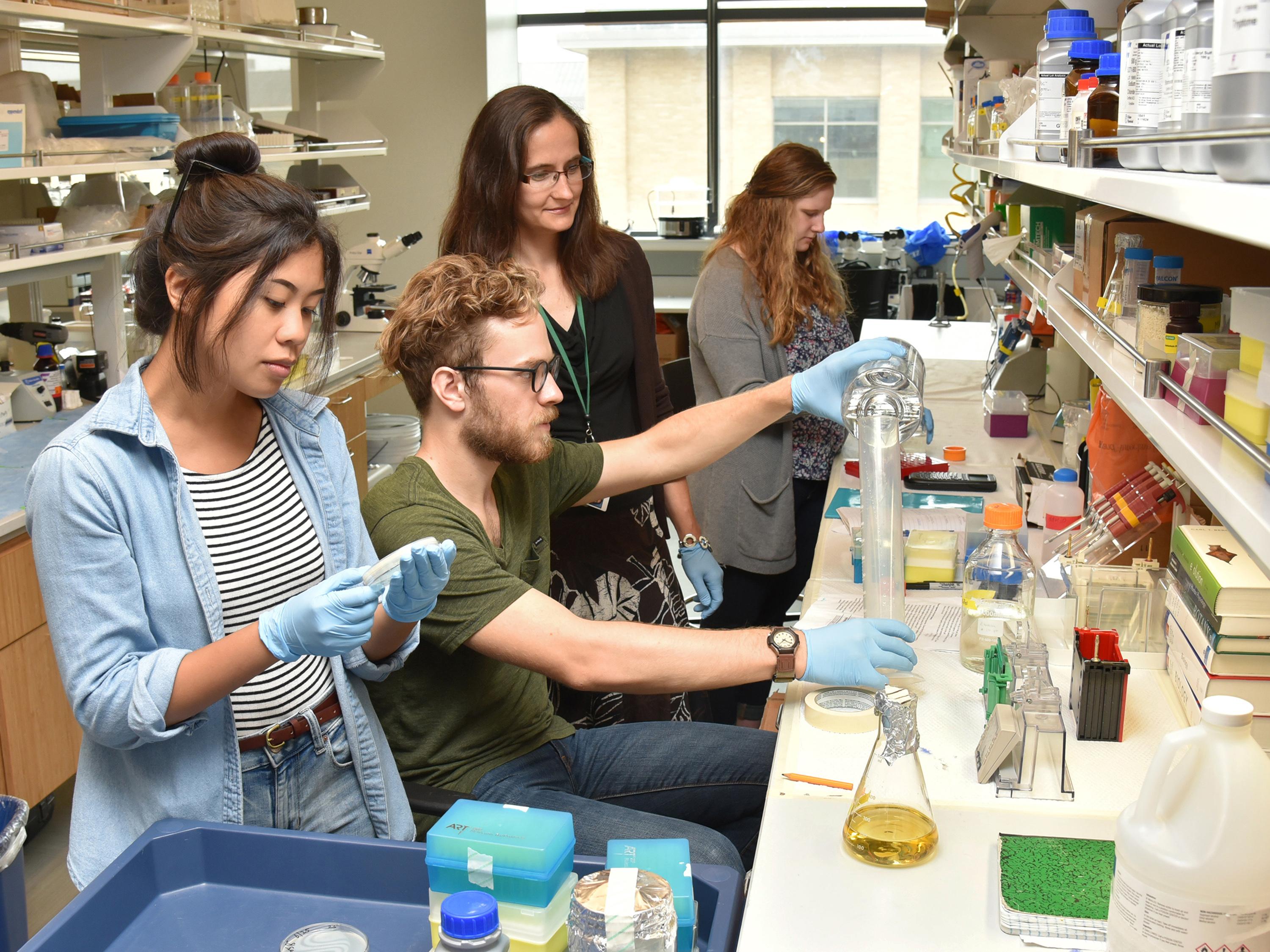SUNY Oswego honored two faculty members with the Award of Excellence in Research and Sponsored Programs, based on outstanding dedication to seek and obtain external funding, and the cumulative funds in which they have received.
Scott Steiger, who teaches meteorology for the department of atmospheric and geological sciences, earned a gold medal for reaching $1 million in cumulative external funding.
Yulia Artemenko of the biological sciences faculty (pictured with student researchers) was recognized with a bronze medal for exceeding $250,000 in cumulative funds received.
The awards took place Wednesday, Aug. 21, among a variety of honors for faculty and staff as part of the college’s annual Academic Retreat.
“This award not only highlights your impressive ability to procure external monies in the highly competitive funding environment that we currently face and the innovative nature of your research program, but also truly epitomizes your strong commitment to academic and scholarly excellence at SUNY Oswego,” William Bowers, associate provost for research development and administration, said in informing the researchers on their honors.
Studying storms
Steiger’s research on extreme weather, particularly lake-effect storms, has resulted in multiple grants and longstanding opportunities for student meteorologists to learn about phenomena first-hand.
He oversees the Lake-Effect Storm Prediction and Research Center (LESPaRC) on campus, which fulfills three goals: to create more opportunities for student research, to provide clients with helpful weather forecasting information to assist in their decision making and to create connections between other academic institutions and other forecasting programs such as the National Weather Service Offices in Buffalo and Binghamton. The work has contributed to Oswego becoming a nationally-recognized destination for aspiring meteorologists.
Multiple National Science Foundation (NSF) grants have supported a variety of vehicles, probes and instruments that can fly right into lake-effect storms to study their structures, as well as track movement and conditions to better predict these impactful storms. Some of the Oswego efforts have been part of a wider team of universities and agencies tracking and finding ways to better anticipate extreme weather.
A previous funded project “gave us some insight into the detailed structures of the snow bands," Steiger said when he received a $320,000 NSF grant for more intensive study. "There were a lot of instances of spinning air -- we call them vortices, about a hundred meters wide. They could have been related to waterspouts, we really don't know. We really want to investigate how and why these areas of rotation form in the snow band. These areas of rotation can influence where the band moves, how heavy the snow gets."
Researching cell movement
Artemenko’s signature project, funded by a nearly $300,000 NSF grant, involves working undergraduate researchers to investigate how single cells determine where to move, which could have implications for why cancer cells metastasize -- migrate away from a primary tumor.
For the Research in Undergraduate Institutions grant-supported program "Molecular Interplay Between Cell Adhesion and Directed Migration," researchers use a model organism, a social amoeba, to study the molecular pathways that allow cells to move in response to different triggers, as well as the role of cell attachment to a surface in recognizing some of those triggers. These processes resembles what happens to cells in humans with cancers and other diseases.
The grant and other funding allow students to gain paid in-depth hands-on experience with instruments, techniques and content related to this potentially impactful research. The project also supports student opportunities such as conference presentations and publications, as well as collaboration with international researchers.
"All the research we do in this study is driven by undergraduate students," Artemenko said. "With an RUI grant, the focus is different. There is a lot of focus on training students to become better scientists."
For more information on research and grant-related endeavors at SUNY Oswego, visit the Office of Research and Sponsored Programs website.




